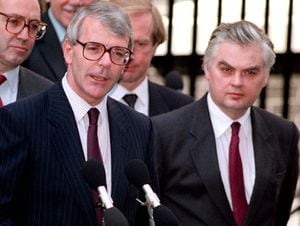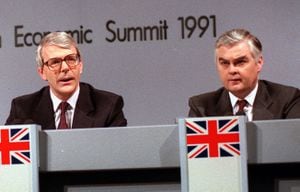1992: Black day when interest rates rocketed to 15 per cent
The day began with interest rates at a sky-high 10 per cent. By lunchtime they had risen to 12 per cent, and in the afternoon they stood at 15 per cent.

If you think the economy is in a state of mayhem today, it is nothing to the madness which took place 30 years ago today – the day which became known as Black Wednesday.
Bill Cash, now Tory MP for Stone but in 1992 Stafford's MP, launched a scathing attack on the Government, and Chancellor of the Exchequer Norman Lamont in particular.
"I think that the position of Norman Lamont at the moment is extremely precarious," he said. "We are in a state of political shambles."
It was the day that Britain's brief flirtation with European Economic Monetary Union – or Emu for short – came to a devastating end. It shattered Britain's already tense relationship with the Common Market, shaped Britain's political landscape for a generation, and paved the way for Britain's exit from the emerging European Union.

The chain of events which led to the economic meltdown of September 16, 1992, had actually begun more than 13 years earlier, with the establishment of the European Exchange Rate Mechanism, or ERM, in 1979. Planned as a forerunner to a single European currency, which would become the euro, the principle was quite simple: different European countries retained their existing currencies, but agreed to maintain stable exchange rates by using reserves to buy currencies that became too weak, or sell them when they became too strong.
Britain's new Chancellor, Geoffrey Howe, was keen to join the mechanism – also known as "The Snake" because it allowed for a bit of wiggle room, but was overruled by the newly elected Margaret Thatcher. More than 11 years later, and leading a Government heavily divided over Europe, the Iron Lady was finally persuaded into making a U-turn by her latest Chancellor, the recently appointed John Major, supported by Foreign Secretary Douglas Hurd. At the time, sterling was riding high against the German Mark, and the exchange rate was pegged at DM2.92, plus or minus six per cent, a rate that would quickly prove unsustainably high.
To compound the problem, the decision to fix exchange rates came at a time when the economies of the world were just starting to diverge.
The reunification of Germany had sparked a consumer boom and a surge in inflation, causing the German central bank to raise interest rates. Britain and the rest of Europe, were heading for recession, and needed interest rates to be low, but the requirements of the ERM would not allow this. To compound the problem, the US dollar had also fallen in value, leaving the pound in an imposible no-man's land somewhere in the middle.
Currency speculator George Soros spotted the weakness, and boasting of making £1 billion profit buying and selling currency he never actually owned.
In simple terms, he borrowed huge amounts of sterling and used it to buy German Marks. This flooding of the market devalued the pound, but bolstered the price of the Mark, meaning he could then buy the sterling back at a more favourable exchange rate to pay off his loan.
"It is easy, you borrow sterling, sell the sterling you borrowed, and you buy back the sterling when the loan expires," he said.
But while Soros might have made a quick killing, it was a terrifying day for people who had bought homes during the Thatcher housing boom, watching interest rates rocket before their very eyes.
Major, by this time the Prime Minister who had been on a roll since his stunning election victory just five months earlier, instructed his Chancellor Norman Lamont to buy sterling on an industrial scale to prop up the currency, but it was to no avail as the currency speculators were selling the currency at a faster rate than he could buy it.
At 10.30am, the Government announced a shock two per cent rise in interest rates to 12 per cent, in an attempt to persuade speculators to buy pounds. Later in the day the Bank of England said it would raise base rates to an eye-watering 15 per cent, but to little avail. The city did not believe that such high rates would be maintained at a time of recession, so the dealers kept selling pounds.
Major recalled his Chancellor, Norman Lamont, visiting him with the bad news.
"Norman Lamont came in and he was pretty white-faced and edgy as well he might have been and he said 'It hasn't worked', by which he meant the intervention and the two per cent interest rate rise hadn't worked and they were still selling."
By teatime, it was clear the policy was untenable, and an ashen-faced Lamont announced that Britain's membership of the ERM would be suspended, and that the second interest rate hike of the day would not go ahead. Treasury papers later revealed that he had opposed the attempts to shore up the currency, particularly with regard to using so much in the way of foreign reserves to buy sterling.
Major said he returned to his flat to consider his future:
"I went back to my flat to think about the events of the day, I sat there for some time considering what the future might be and I wasn't at all certain that I could or even should remain as Prime Minister," he said.
"The case for me to resign was fairly straightforward. I had been Chancellor when we entered the ERM, I had been Prime Minister when were ejected from the ERM and it was a political disaster.
"Was I, therefore, in a position to resurrect European and economic policy or could it be better done by someone else? For several weeks thereafter, I still wondered whether it was the right thing to do – to stay or to go – and I was persuaded to stay, but I shall probably wonder to the end of my days whether it was the right decision."
He decided to stay, but the debacle would cost him dear. Ironically, Britain's ejection from the ill-fated ERM led to 16 years of economic growth, but Major's government would see no benefit.
The debacle left his reputation as a competent manager of the economy in shreds, his government limping on for the next five years as the revitalised Labour Party under John Smith and then Tony Blair opened up a commanding lead in the polls.
It also led to the effective collapse of the ERM, dubbed the Eternal Recession Mechanism by Tory right-winger Norman Tebbit.
Italy also dropped out shortly after, forcing the EEC to widen the permitted bands to such an extent that all currencies were effectively floating freely.
The debacle also pretty much killed off any chance of joining the single European currency, and led to a new wave of Euro-scepticism which culminated in Britain's withdrawal from the European Union.
It also gave us an early glimpse of a tall, young aide standing in the shadows of the Chancellor as he sheepishly announced Britain's withdrawal from the ERM, whose own career would also be cut short by debates about Britain's future in the European Union? Who was he? Norman Lamont's special adviser, David Cameron.
